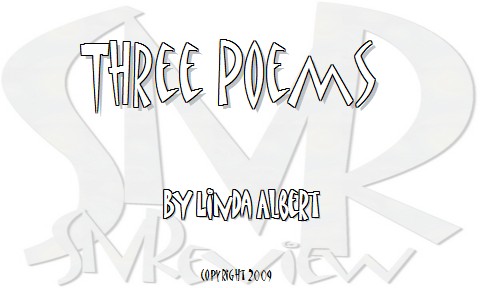|
Home
Current
Issue
Summer
2008
Spring/Summer
2008
Winter/Spring
2008
Autumn
2007
Summer
2007
Spring
2007
Winter
2007
Autumn
2006
Summer
2006
Spring
2006
Winter
2006
Fall
2005
Summer
2005
Editor's
Note
Guidelines
SNR's
Writers
Contact
|

This
Is the Year the Dead Come Marching
This
is the year the dead come marching,
Not soldiers, accident
victims,
strangers we cluck our tongues about
and then go
back to eating, shopping,
making much of small things; no
now
it's a parade of people we know;
young, old, our age –
the nerve -
old friends, old loves, the man who did
our
hair, a new acquaintance full of promise,
a colleague, and a
cousin's husband -
waving flags of their uniqueness in our
faces,
leaving images of themselves - kirlian
photographs
implanted on our eyelids, their voices
engraved inside our ears. This year,
we're
surprised by too many ghosts,
they deliver packages
tumbled
with ribbons of memories; confettied
with regrets.
We're not ready for this.
There is unfinished business;
forgiveness
we had yet to find, get well cards
we never
got around to sending, soup
we never brought, words we
thought
we still had time to say, caresses, hugs,
some
needed thank yous. The dead
celebrate their endings
despite us.
The band is playing just for them.
They turn
the corner without us.
They are at peace. They
leave
their auras behind for us to carry.
The littered
street is ours to clean.
|
|
Sometimes
It All Dies
those
creative juices – like the red grapes
in the glass dish
on the top shelf
of the refrigerator, now wrinkled
as
raisins. No longer fit to be consumed,
yet no one wants
to throw them out,
as though some miracle of resurrection
might still be possible.
Or maybe someone will still come
along
starved enough to want to eat them.
How
does this happen – weeks of harvest -
poems and stories
sweet on every vine and bush
then gone one day, a waste
land?
As though words have lost their strength
to grow;
the passion in the writer's soil
turned barren.
What
is needed here? Plow through, sow seeds
so poor and
piteous that only weeds would likely flower;
hope anyway for
rain and blooming, or heed the wisdom
of the farmer who knows
when time has come
for land to rest, lie fallow?
And
oh, to know the difference.
|
|
Reflection
I
remember it vividly -
how I was taking my nightly bath;
lying
naked and a little chilly in the tub,
not thinking about
anything special,
or pondering a different problem
as Auden
knew the Old Masters
understood. Only this time
it
was the relief of suffering - a jolt
in every cell so great
my body
leaped. It's a wonder
I wasn't electrocuted
–
found floating face down;
bath oil sliding in
greasy scales
down my lifeless back, just now
when knowing
could make my life
begin. The usual irony. But
no;
there's also magic in these tales.
The mirror I'd
looked in all those years,
the Mirror, Mirror on the
wall;
that kept me snared and found me wanting;
whose
tarnished silver
backed a bleak and murky surface
rejecting
light, was nothing but an object;
mirrors don't really talk,
or have opinions.
Amazing that I never noticed.
Turns out
it's voice was in my head;
the power was mine to name
the seeing.
not a jealous Queen's who'd kill for my
reflection.
The Old Masters must have also known
this human position;
how something
momentous can happen
while someone else is eating or opening a
window
or Icarus has not fallen after all
into the sea.
|

